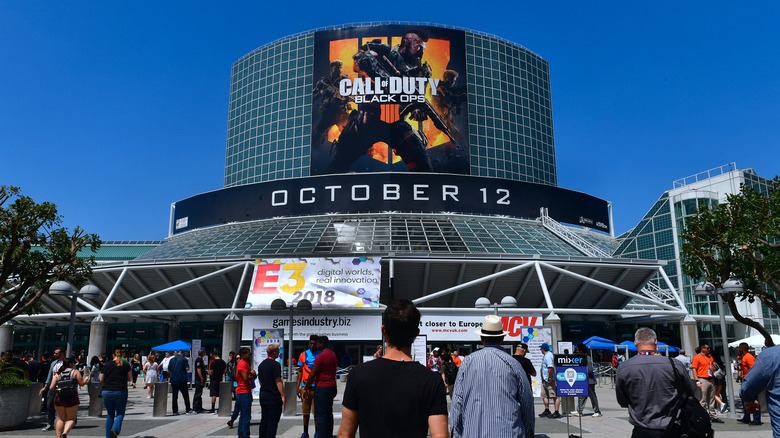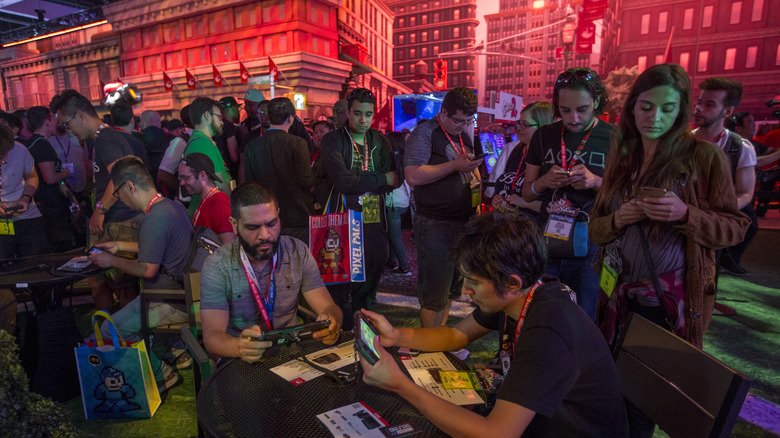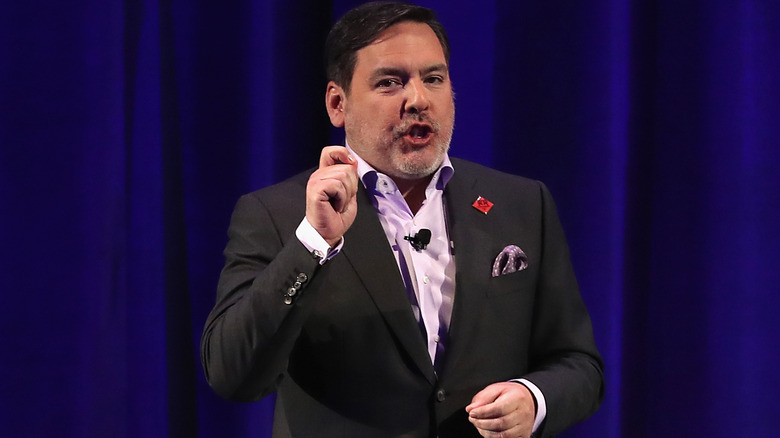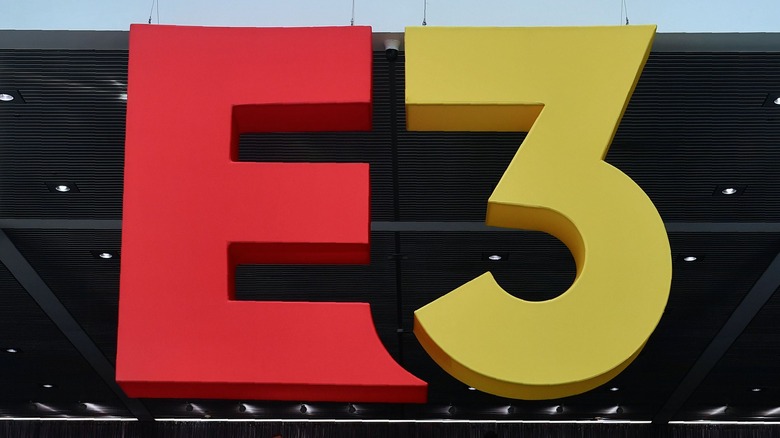The Shady Side Of E3
At first glance, the Electronic Entertainment Expo seems like little more than a fun showcase of the gaming industry's latest and greatest. Big companies always come decked out with their fanciest stuff, showcasing the shiniest in new graphics, consoles, and experimental hardware. E3 is a chance for us, the consumers, to catch up with our old pals Master Chief and Mario, and to revisit old favorites made new again via surprise sequel announcements. And then there's all the new IP and technology unveilings, as well. On the surface, E3 is a place of pure joy for gamers.
Beneath that endearing facade, however, is an expo that has lied to you, deceived you, and even endangered you. And, unfortunately, there's very little hyperbole there — E3 isn't just gaming's cultural Mecca, it's also the industry's worst nightmare. Get ready to find out how E3 has, time and time again, betrayed gamers and evolved into the industry's shadiest showcase.
Game downgrades
Let's start off with the biggest sin E3 is famous for: false promises and brazen lies. If you've ever watched a Ubisoft E3 press conference, you know exactly what we're talking about: one year they'll showcase the most visually stunning and conceptually revolutionary gameplay demo of all-time, and then three years later the game will actually release and it'll be uglier, less interesting, and an all-around massive disappointment by comparison.
Ubisoft's not the only publisher who uses E3 to flat-out lie to consumers. Microsoft's done it to, for those of you who remember Halo 2's infamous E3 demo. Or Sony's equally scummy Killzone 2 presentation. We just give Ubisoft a little extra guff for having the gall to continue to do this so blatantly up until very, very recently (and are we even sure it's stopped?). And other publishers are sneaking in this fake nonsense in little ways all the time, meaning even more recent titles like Sony's Spider-Man are getting hit with "E3 fakeout" allegations.
Point is, if you see it at E3, don't trust it.
"Live" demos
While fictitious gameplay demos are infuriating enough, they're not the only trick in the book that publishers have. Case in point: fake "live" gameplay demos. While these demos can showcase a version of a game quite close, if not identical to the version that will release to the masses eventually, they're pre-recorded so that no unscripted shenanigans can occur. This means any glitches, bugs, out-of-bounds areas, or underdeveloped aspects of the game in question won't be present, since everything's been recorded ahead of time. That's fair, right? Well, not when you consider these same publishers sometimes have someone pretending to play the game "live" on-stage so that people think a game is being put through its paces in real-time.
While this isn't a major issue given that most AAA games release in perfectly acceptable working order, it does hide the pitfalls of games that publishers might plan on rushing out a little unpolished. However, in the case of games that are a bit trickier to ensure the performance of, such as Kinect games, this fake "live" demo trick becomes seriously sinister. How many people can say their time with Star Wars Kinect was anything remotely like this staged E3 demo, wherein things seemed to work perfectly? We'd venture a guess the Kinect's far-too-immediate responses to the E3 presenter's gestures onstage are a good indicator that this flawless demo falls squarely under our "live" presentation fake-out umbrella.
Hardware deception
You'd think, between entirely fake demos and demos built to fake the real thing, publishers would have their "corporate deception" bases covered. Yet that's not the case, thanks to the boundless pressure E3 indirectly puts on publishers to make sure their games look absolutely perfect.
Back when the Xbox One was still brand new and dev kits weren't always available or ready to power public showcases, Microsoft saw fit to use gaming PCs disguised as Xbox Ones to power its E3 demos. Such was the case with Ryse: Son of Rome, a visually extravagant game that began its life as an Xbox One exclusive (though it eventually came to PC). Microsoft didn't trust its own console enough to showcase Ryse, so it tried to fake everyone out. And then the company did it again, at E3 2016 (but this time 'fessed up that it was using PCs with Xbox-flavored frosting on top).
What makes this tactic extra suspect is that we don't know if Microsoft is the only company pulling stealth-PC hijinx at E3; all we know is that it's the company that got caught.
Incentivized resource misallocation
Perhaps publishers need all these tricks and deceptions to gussy up their underbaked products because they're spending too much effort on showing them off in the first place. After all, it's not as easy as simply cutting out a slice of a game and playing it for a live audience. A lot more work goes into E3 showcases — sometimes so much work that resources that could've gone to the game itself are reallocated for E3 presentation endeavors. It's self-defeating and downright stupid from a "let's make the best game possible" standpoint, but this approach is often taken because many shareholders believe top-tier marketing is more important than producing a top-tier game. That's the power of short-term thinking!
Situations where this E3-first mentality has hurt development range from those detailed by the unknown, confidential leakers of unnamed studios to the more public cases, such as that of Halo 2, wherein the poor devs at Bungie produced an entire graphics engine that ultimately only ever ended up being used for the E3 demo.
Endangerment of the masses
Up until 2017, E3 was content to pull a Willy Wonka and make its factory of technological wonder invite-only. However, given the tough financial times, and with industry big boys like Blizzard and EA not doing E3 anymore, the latter had to come up with ways to keep the money rolling in. One way was opening the floodgates to regular folks. And though E3 sold many, many tickets, that windfall came at a price: enjoyment and safety for the attendees. In its haste to make money, E3 hadn't made sure the expo's 2017 showfloor could comfortably accommodate so many new bodies. Similarly, security wasn't top-notch thanks to the influx of people, more than E3's security could keep its eyes on. In short, E3 was woefully underprepared to keep its attendees safe from theft, overcrowding, and a generally unpleasant experience.
Though E3 2018 didn't make the news for anything quite as upsettingly noteworthy as 2017, it still remains a bit of an overcrowded mess, cramming too many people into the same convention center. Only time will tell if E3 remedies this issue in the future.
Ghost games
There's nothing worse than when companies use E3 to generate phantom buzz. While it makes sense to drum up hype for a game that's right around the corner, which Bethesda likes to do, other publishers like to use the expo for games that are years, if not decades, away from ever seeing the light of day. It's downright cruel. Square Enix is a constant offender when it comes to this shady element of E3: be it The Avengers Project, Final Fantasy 7 Remake, or Kingdom Hearts 3, Square Enix is constantly dangling carrots in front of gamers' mouths — carrots they often won't get to taste for many, many years.
Why do it? To make people starve for more, of course. All eyes and associated press coverage are always on publishers like Square at E3, solely because the company has fed just enough breadcrumbs to their loyal consumers to give them hope and anticipation for real announcements. It's manipulative, scheming, and one of the worst parts of E3. And Square's not the only company to use E3 to market phantom products like this — Ubisoft does it too, like with Beyond Good and Evil 2. Or Sony, with its infamous The Last Guardian.
Psychological conditioning
E3 isn't just an expo for games, but also a megaphone for gaming industry figureheads. And with said megaphone comes the unsavory reality that these figureheads often say very, very uncool things in an attempt to mold consumers' minds and turn them into brain-dead, money-hurling sheep with no individual expectations.
Remember Microsoft's unveiling of the Xbox One? Microsoft claimed it knew what was best for consumers, and that "always online" and "Kinect 2.0" were the ways of the future. Heck, the head of Microsoft's Xbox division at that time, Don Mattrick, even said people in the military should suck it up and keep playing on the Xbox 360 if they couldn't get good enough internet for Xbox One. Thankfully, this was one instance where consumers pushed back against Mattrick and Microsoft's blatant obtuseness.
However, this happens often. Look at Sony's biggest E3 2018 speaker, Shawn Layden. He said, "Don't come here expecting to have some big flashy new idea come out," and, "I think the folks at home should be happy with what they're gonna get." He was telling you, the customer, to shut up and be grateful for what Sony was putting on display. And the sad part? Most people were pretty content with Sony's showcase of only four major games, all of which were standard third-person action-adventures lacking any ambitious gameplay innovations.
Always remember: E3's platforming of these sorts of people needs to be counterbalanced by us not letting their "we know best" bravado go unchecked.
Redefining the word "exclusive"
Something Microsoft's had a hard time doing in the 2010's is securing genuinely exclusive titles for its Xbox library. Due to its inability to just buckle down and pump out good first-party games, we've been subjected to the bastardization of the term "exclusive," as the company plays with ways to make the term mean less and less each year. There's been the "temporary Xbox exclusive," a la Rise of the Tomb Raider, wherein Microsoft pays a third-party publisher to get a game on its console first. There's been the "timed exclusive," wherein formerly Microsoft and now Sony claim its console gets Call of Duty DLC exclusively* (*for a few months). And of course, how can we forget the "console exclusive" — Microsoft's neat way of saying a game will be on PC too, so it's not really exclusive to Xbox One as long as you own a decent gaming PC.
Though Microsoft's the biggest offender, it's not a crime exclusive (heh) to them. Publishers and hardware manufacturers use E3 (and other conferences such as Gamescom) to stave off the bloodlust wrought by consumers seeking armaments for their battles in the console war, a war arbitrarily fought with exclusives. Will the day come when the term "exclusive" can be de-weaponized? Maybe. But not any day soon.
Too much power
Think of how E3 influences the industry. One could argue the reason the PS4 maintains its momentum and hefty sales lead over the Xbox One is because of the insane boost the former's launch got after Sony suplexed Microsoft into submission at E3 2013. That single E3 set the tone for an entire generation of consoles, all because Sony used its conference to say "we'll treat gamers right" after Microsoft completely fumbled its Xbox One announcement.
And then there's Watch_Dogs, otherwise known as E3's greatest lie. Because of how beautifully it was portrayed at E3, it went on to become Ubisoft's best-selling new IP for quite some time — even though reviews were mixed and many people were disappointed by what Watch_Dogs ended up being.
E3 determines what will be in all of the gaming media's headlines for weeks at a time; it determines what games will drown into obscurity and which will be plastered into everyone's' memories. If a game ends up on a "Worst of E3" list, it might be dead on arrival regardless of its merits. E3 is a powerful arbiter of taste in the industry, so be careful — don't let it decide what's hot and what's not on your behalf.










